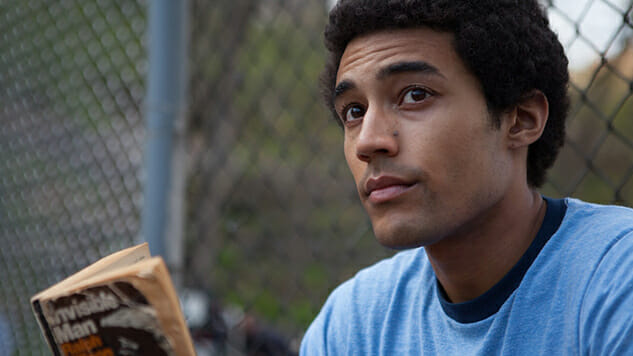Barry

As President Barack Obama wraps up his final week in office, journalists, pundits and historians are reflecting on his administration and his impact on society. Looking back much further is the Netflix production of Barry. This narrowly framed fictionalization of Obama’s college years at Columbia University opens with Barry arriving in a bustling, dilapidated, graffiti-laden New York in August 1981. The city is also where the film will close, and in between it follows the future president around campus, along the streets of his Harlem neighborhood and into house parties and restaurants—every scene calculated to emphasize his wisdom and self-consciousness about floating on the periphery of society. The execution of this approach takes an interesting idea (a portrait of a historic figure in his formative years) and renders it a dramatically inert, intellectually ossified curio. The future leader of the free world might as well be Bowie’s Starman, so intent is Barry on showing its protagonist as a kind of alien hero with insight and intelligence beyond that of mere mortals.
This outsider persona is one of the romantic notions of Barry: our first black president as bookish, slightly introverted and whip-smart. As Barry, Devon Terrell embodies the reserve, detachment and air of cool associated with his real-life counterpart. Terrell’s got the smooth resonance of Obama’s voice down, along with the famous intellectual stammer that comes into play when his character is giving thought to contentious topics, like those he engages about race, identity and the concept of “home.” For him to hold forth on those subjects, the movie is constructed like a series of carefully crafted set-pieces.
An early scene in Barry finds students and their instructor half-smiling with admiration at Barry’s theory of governance, with only the most ignorant—presented as a hawkish white Reaganite—daring to disagree. Such is his power that one of those classmates, Charlotte (an excellent Anya Taylor-Joy), will become his girlfriend. Their multiracial relationship will then offer Barry all manner of opportunities to test the limits of his desire to fit in while encountering a steady stream of racism, classism and narrow-mindedness.
This on-the-nose approach defines the movie’s aesthetics and its politics. On his first night in New York, Barry is confronted by a white police officer for not having his campus ID, while a white student is given a pass for open-carrying a beer. Later, Barry’s called “College Boy” in disparaging tones by a local who hangs out in front of his building, while his girlfriend’s father (Linus Roache) mistakes him for a bathroom attendant and never apologizes once he realizes the gaffe. Despite each affront, Barry carries on with poise, avoiding confrontation and insinuating himself into the confidence prejudiced toward him with his charm, acquiescence and intelligence, as if the film is setting up a direct line of causation between Barry’s ideal qualities and his presidency. While playing streetball, for example, Barry exercises his diplomacy skills by stepping in to break up a fight. As part of an expansive narrative, these scenes might play better, but because they make up the entirety of Barry, the movie’s insights don’t unfold. It’s all mostly didactic and obvious.